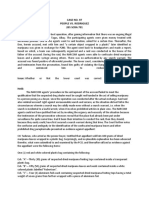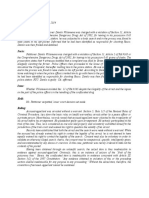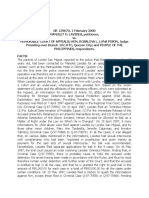100%(1)100% found this document useful (1 vote)
3K viewsPeople V Racho Digest
People V Racho Digest
Uploaded by
Sharon G. BalingitThe police received information about a drug deal and arranged a meeting with the appellant through cellular phone calls. When the appellant arrived by bus in Baler, Aurora, police approached him as he was about to get into a tricycle. A small packet of shabu drug fell from his pocket. He was charged with drug possession and delivery. The Supreme Court ruled the evidence was inadmissible because the warrantless arrest was not valid, lacking probable cause beyond just reliable information. It was an instance of illegally obtaining, or the "fruit of the poisonous tree" doctrine. The Constitution requires judicial warrants for searches and seizures, except in certain enumerated exceptions like consent or exigent circumstances, which did not apply in this case.
Copyright:
© All Rights Reserved
Available Formats
Download as DOCX, PDF, TXT or read online from Scribd
People V Racho Digest
People V Racho Digest
Uploaded by
Sharon G. Balingit100%(1)100% found this document useful (1 vote)
3K views1 pageThe police received information about a drug deal and arranged a meeting with the appellant through cellular phone calls. When the appellant arrived by bus in Baler, Aurora, police approached him as he was about to get into a tricycle. A small packet of shabu drug fell from his pocket. He was charged with drug possession and delivery. The Supreme Court ruled the evidence was inadmissible because the warrantless arrest was not valid, lacking probable cause beyond just reliable information. It was an instance of illegally obtaining, or the "fruit of the poisonous tree" doctrine. The Constitution requires judicial warrants for searches and seizures, except in certain enumerated exceptions like consent or exigent circumstances, which did not apply in this case.
Original Description:
Crim Pro case
Original Title
People v Racho Digest
Copyright
© © All Rights Reserved
Available Formats
DOCX, PDF, TXT or read online from Scribd
Share this document
Did you find this document useful?
Is this content inappropriate?
The police received information about a drug deal and arranged a meeting with the appellant through cellular phone calls. When the appellant arrived by bus in Baler, Aurora, police approached him as he was about to get into a tricycle. A small packet of shabu drug fell from his pocket. He was charged with drug possession and delivery. The Supreme Court ruled the evidence was inadmissible because the warrantless arrest was not valid, lacking probable cause beyond just reliable information. It was an instance of illegally obtaining, or the "fruit of the poisonous tree" doctrine. The Constitution requires judicial warrants for searches and seizures, except in certain enumerated exceptions like consent or exigent circumstances, which did not apply in this case.
Copyright:
© All Rights Reserved
Available Formats
Download as DOCX, PDF, TXT or read online from Scribd
Download as docx, pdf, or txt
100%(1)100% found this document useful (1 vote)
3K views1 pagePeople V Racho Digest
People V Racho Digest
Uploaded by
Sharon G. BalingitThe police received information about a drug deal and arranged a meeting with the appellant through cellular phone calls. When the appellant arrived by bus in Baler, Aurora, police approached him as he was about to get into a tricycle. A small packet of shabu drug fell from his pocket. He was charged with drug possession and delivery. The Supreme Court ruled the evidence was inadmissible because the warrantless arrest was not valid, lacking probable cause beyond just reliable information. It was an instance of illegally obtaining, or the "fruit of the poisonous tree" doctrine. The Constitution requires judicial warrants for searches and seizures, except in certain enumerated exceptions like consent or exigent circumstances, which did not apply in this case.
Copyright:
© All Rights Reserved
Available Formats
Download as DOCX, PDF, TXT or read online from Scribd
Download as docx, pdf, or txt
You are on page 1of 1
G.R. No.
186529
August 3, 2010
PEOPLE OF THE PHILIPPINES, Appellee,
vs.
JACK RACHO y RAQUERO, Appellant.
A confidential agent of the police transacted through cellular phone with appellant for the purchase
of shabu. Appellant called up the agent and informed him that he was on board a Genesis bus and
would arrive in Baler, Aurora. Having alighted from the bus, appellant was about to board a tricycle
when the team of police authorities approached him and invited him to the police station. As he
pulled out his hands from his pants pocket, a white envelope slipped therefrom which, when
opened, yielded a small sachet containing the suspected drug.5
Appellant was charged in two separate Informations, one for violation of Section 5 of R.A.
9165, for transporting or delivering; and the second, of Section 11 of the same law for possessing,
dangerous drugs.
ISSUE: (1) WON the warrant of arrest was violated.
(2) WON the evidence was admissible in evidence.
RULING: (1) No. Reliable information alone is not sufficient probable cause to effect a valid
warrantless arrest. The SC required the showing of some overt act indicative of the criminal design.
(2) No. This is an instance of seizure of the fruit of the poisonous tree. Hence, the
confiscated item is inadmissible in evidence.
The 1987 Constitution states that a search and consequent seizure must be carried out with a
judicial warrant; otherwise, it becomes unreasonable and any evidence obtained therefrom shall be
inadmissible for any purpose in any proceeding.17 Said proscription, however, admits of exceptions,
namely:
1. Warrantless search incidental to a lawful arrest;
2. Search of evidence in "plain view;"
3. Search of a moving vehicle;
4. Consented warrantless search;
5. Customs search;
6. Stop and Frisk; and
7. Exigent and emergency circumstances.18
You might also like
- 59 Digest Fajardo V Atty. AlvarezDocument1 page59 Digest Fajardo V Atty. AlvarezSharon G. Balingit100% (2)
- Luz vs. PeopleDocument2 pagesLuz vs. PeopleMaestro Lazaro100% (1)
- Crafting Ordinances & ResolutionsDocument17 pagesCrafting Ordinances & ResolutionsSharon G. Balingit100% (10)
- Digest - Dela Cruz Vs PeopleDocument2 pagesDigest - Dela Cruz Vs PeopleRosemary Red100% (2)
- People vs. Nuevas G.R. No. 170233, February 22, 2007 FactsDocument2 pagesPeople vs. Nuevas G.R. No. 170233, February 22, 2007 FactsJessamine Orioque67% (3)
- People vs. Libnao (GR 136860, 20 January 2003)Document3 pagesPeople vs. Libnao (GR 136860, 20 January 2003)Ei BinNo ratings yet
- Del Castillo Vs People Prohibition On Unlawful SearchDocument2 pagesDel Castillo Vs People Prohibition On Unlawful SearchRowardNo ratings yet
- People Vs Jerry Sapla y Guerrero, GR No. 244045, June 16, 2020Document3 pagesPeople Vs Jerry Sapla y Guerrero, GR No. 244045, June 16, 2020Jheanniver Nablo-Peña100% (2)
- Villasenor vs. AbanoDocument2 pagesVillasenor vs. AbanoJessamine OrioqueNo ratings yet
- Digest Gimeno V Atty. ZaideDocument2 pagesDigest Gimeno V Atty. ZaideSharon G. Balingit100% (2)
- People Vs RachoDocument1 pagePeople Vs RachoJudy Miraflores Dumduma100% (1)
- G.R. No. 120915 People Vs ARUTADocument1 pageG.R. No. 120915 People Vs ARUTAJoyce Sumagang Reyes100% (2)
- Enrile Vs Sandiganbayan DigestDocument2 pagesEnrile Vs Sandiganbayan DigestGlaiza CelNo ratings yet
- People v. Malmstedt DigestDocument3 pagesPeople v. Malmstedt DigestJulian Velasco100% (2)
- ARABEJO - People vs. ManluluDocument4 pagesARABEJO - People vs. ManluluDominic EmbodoNo ratings yet
- WORLDWIDE WEB CORPORATION vs. PEOPLEDocument1 pageWORLDWIDE WEB CORPORATION vs. PEOPLEMariaFaithFloresFelisarta100% (1)
- People v. Canoy DigestDocument2 pagesPeople v. Canoy DigestBinkee VillaramaNo ratings yet
- 4 - LAUD v. PEOPLEDocument2 pages4 - LAUD v. PEOPLEVince Llamazares LupangoNo ratings yet
- Stephen Sy V PeopleDocument2 pagesStephen Sy V PeopleOculus DecoremNo ratings yet
- People Vs Chi Chan LiuDocument2 pagesPeople Vs Chi Chan LiuAlexa TorrilloNo ratings yet
- PEOPLE VS. SAPLA - Atty Brenda's Digest PDFDocument3 pagesPEOPLE VS. SAPLA - Atty Brenda's Digest PDFJoan Ursua75% (4)
- People v. Gerente, 219 SCRA 756Document1 pagePeople v. Gerente, 219 SCRA 756Jemson Ivan Walcien100% (2)
- San Agustin V PeopleDocument1 pageSan Agustin V PeopleAnn QuebecNo ratings yet
- PP Vs CFI DigestDocument1 pagePP Vs CFI DigestJuLievee Lentejas100% (1)
- Luz vs. PeopleDocument2 pagesLuz vs. PeopleWayne Libao Forbes100% (2)
- 3 - Sanchez V PeopleDocument3 pages3 - Sanchez V PeopleVince Llamazares Lupango100% (1)
- Case No. 97 People vs. Rodriguez 205 SCRA 791 FactsDocument2 pagesCase No. 97 People vs. Rodriguez 205 SCRA 791 FactsLaila Ismael SalisaNo ratings yet
- People Vs Maspil JR DigestDocument1 pagePeople Vs Maspil JR DigestLex OcsNo ratings yet
- DIGEST - Manalili Vs CADocument2 pagesDIGEST - Manalili Vs CARichel Dean100% (1)
- 134) de Los Santos-Dio V CaguioaDocument2 pages134) de Los Santos-Dio V CaguioaAlfonso DimlaNo ratings yet
- People V Pastrana and Abad DigestDocument1 pagePeople V Pastrana and Abad DigestPam Babas100% (1)
- People Vs Sy ChuaDocument3 pagesPeople Vs Sy ChuaJessamine OrioqueNo ratings yet
- Del Castillo Vs PeopleDocument2 pagesDel Castillo Vs PeopleKristine Garcia100% (2)
- 35.1 Manalili vs. Court of Appeals (G.R. No. 113447 October 9, 1997 (280 SCRA 400) ) - Case DigestDocument2 pages35.1 Manalili vs. Court of Appeals (G.R. No. 113447 October 9, 1997 (280 SCRA 400) ) - Case DigestAmir Nazri KaibingNo ratings yet
- Villanueva V PeopleDocument1 pageVillanueva V PeopleAbigail TolabingNo ratings yet
- People v. BaloloyDocument1 pagePeople v. BaloloySei KawamotoNo ratings yet
- People vs. Molina 352 SCRA 174Document2 pagesPeople vs. Molina 352 SCRA 174Ermelyn Jane Celindro100% (5)
- People vs. Aruta Case DigestDocument3 pagesPeople vs. Aruta Case DigestRhea Razo-Samuel100% (1)
- Estrada Vs Ombudsman DigestDocument3 pagesEstrada Vs Ombudsman Digest莊偉德75% (4)
- Mahinay Case DigestDocument5 pagesMahinay Case DigestChickoy Ramirez100% (2)
- People Vs SalanguitDocument3 pagesPeople Vs SalanguitjovifactorNo ratings yet
- Ho Vs PeopleDocument2 pagesHo Vs PeopleAlice100% (2)
- People V Judge AysonDocument3 pagesPeople V Judge AysonGenevieve Kristine Manalac100% (7)
- Sanchez v. People, G.R. No. 204589, November 19, 2014Document2 pagesSanchez v. People, G.R. No. 204589, November 19, 2014Jemson Ivan Walcien67% (3)
- Comerciante vs. People PDFDocument4 pagesComerciante vs. People PDFKJPL_1987100% (1)
- 1 - GR No. 195032 Braza V SandiganbayanDocument2 pages1 - GR No. 195032 Braza V SandiganbayaniamReadyPlayerOne100% (2)
- People v. Che Chun Ting, 328 SCRA 592.digestDocument2 pagesPeople v. Che Chun Ting, 328 SCRA 592.digestDominique Vasallo100% (1)
- 1 Ibanez vs. People - GR No. 190798 - Case DigestDocument2 pages1 Ibanez vs. People - GR No. 190798 - Case DigestAbigail Tolabing0% (1)
- People v. Gardon-Mentoy - Case Digest - Searches and SeizuresDocument4 pagesPeople v. Gardon-Mentoy - Case Digest - Searches and SeizuresShella LandayanNo ratings yet
- Salazar v. PeopleDocument2 pagesSalazar v. PeopleEcnerolAicnelav100% (3)
- Digest - Esteban vs. AlhambraDocument2 pagesDigest - Esteban vs. AlhambraMM100% (2)
- Cortes v. CatralDocument2 pagesCortes v. CatralJoycee Armillo100% (3)
- Saldariega v. Panganiban (GR No. 211933 & 211960)Document6 pagesSaldariega v. Panganiban (GR No. 211933 & 211960)Sherlyn SabarNo ratings yet
- People V Holgado DigestDocument2 pagesPeople V Holgado Digestabo8008No ratings yet
- People vs. SayconDocument3 pagesPeople vs. SayconMaria Cherrylen Castor QuijadaNo ratings yet
- Enrile Vs PeopleDocument2 pagesEnrile Vs Peoplelacbayen100% (1)
- Tanenggee v. PeopleDocument2 pagesTanenggee v. Peopleqwerty100% (2)
- Comerciante V. People - GR No. 205926: Exceptions - Stop and FriskDocument2 pagesComerciante V. People - GR No. 205926: Exceptions - Stop and Friskkim_santos_20100% (2)
- People Vs Nuevas DigestDocument2 pagesPeople Vs Nuevas DigestMyra MyraNo ratings yet
- JUDGE FELIMON ABELITA III VS. P/SUPT. GERMAN B.DORIA and SPO3 CESAR RAMIREZDocument2 pagesJUDGE FELIMON ABELITA III VS. P/SUPT. GERMAN B.DORIA and SPO3 CESAR RAMIREZshezeharadeyahoocom100% (1)
- Lavides vs. CADocument3 pagesLavides vs. CAMaestro Lazaro100% (2)
- People of The Philippines, Appellee, JACK RACHO y RAQUERO, AppellantDocument1 pagePeople of The Philippines, Appellee, JACK RACHO y RAQUERO, AppellanttotoNo ratings yet
- People vs. Jack Racho G.R. No. 186529 August 3, 2010 FactsDocument1 pagePeople vs. Jack Racho G.R. No. 186529 August 3, 2010 Factslou annNo ratings yet
- Civil Pretrial BriefDocument4 pagesCivil Pretrial BriefSharon G. BalingitNo ratings yet
- Sex Scandal (Editorial)Document1 pageSex Scandal (Editorial)Sharon G. BalingitNo ratings yet
- Foundation Day (News)Document1 pageFoundation Day (News)Sharon G. BalingitNo ratings yet
- FOUNDATION DAY (News)Document1 pageFOUNDATION DAY (News)Sharon G. BalingitNo ratings yet
- 100 People V Viernes DigestDocument1 page100 People V Viernes DigestSharon G. BalingitNo ratings yet
- 102people V Dawaton DigestDocument1 page102people V Dawaton DigestSharon G. BalingitNo ratings yet
- IRP 17th SB As AmendedDocument17 pagesIRP 17th SB As AmendedSharon G. BalingitNo ratings yet
- Rule 129 1digest Suplico V NEDADocument1 pageRule 129 1digest Suplico V NEDASharon G. BalingitNo ratings yet
- Tumbokon V Atty. Pefianco Paper 2Document5 pagesTumbokon V Atty. Pefianco Paper 2Sharon G. BalingitNo ratings yet
- Ecumenical Prayer For The CourtsDocument2 pagesEcumenical Prayer For The CourtsSharon G. BalingitNo ratings yet
- Digest Quiambao vs. Atty. BambaDocument1 pageDigest Quiambao vs. Atty. BambaSharon G. BalingitNo ratings yet
- Rule 128 1digest Razon V TagitisDocument3 pagesRule 128 1digest Razon V TagitisSharon G. Balingit100% (1)
- Notice of AppealDocument2 pagesNotice of AppealSharon G. BalingitNo ratings yet
- 61 Digest Anglo V Atty. ValenciaDocument2 pages61 Digest Anglo V Atty. ValenciaSharon G. BalingitNo ratings yet
- Digest Sison vs. Atty. ValdezDocument1 pageDigest Sison vs. Atty. ValdezSharon G. BalingitNo ratings yet
- Digest Ong vs. GrijaldoDocument1 pageDigest Ong vs. GrijaldoSharon G. BalingitNo ratings yet
- Digest Sps San Pedro vs. Atty. MendozaDocument1 pageDigest Sps San Pedro vs. Atty. MendozaSharon G. BalingitNo ratings yet
- FT Anglo vs. Atty. Valencia Et Al AC No. 10567 February 25, 2015Document3 pagesFT Anglo vs. Atty. Valencia Et Al AC No. 10567 February 25, 2015Sharon G. BalingitNo ratings yet
- Digest Ong vs. GrijaldoDocument1 pageDigest Ong vs. GrijaldoSharon G. BalingitNo ratings yet
- 27digest Pacana JR V Atty. Pascual-LopezDocument1 page27digest Pacana JR V Atty. Pascual-LopezSharon G. Balingit100% (2)
- 57 Digest Hadjula V Atty. MadiandaDocument1 page57 Digest Hadjula V Atty. MadiandaSharon G. BalingitNo ratings yet
- 1 Digest Harden V Benguet Conso MiningDocument2 pages1 Digest Harden V Benguet Conso MiningSharon G. BalingitNo ratings yet
- 45 Digest West Coast V HurdDocument1 page45 Digest West Coast V HurdSharon G. BalingitNo ratings yet
- 47 Digest Sia V CADocument1 page47 Digest Sia V CASharon G. BalingitNo ratings yet
- 6 Digest in The Matter of Haron MelingDocument1 page6 Digest in The Matter of Haron MelingSharon G. Balingit100% (1)
- 10 Digest Reynoso V CADocument1 page10 Digest Reynoso V CASharon G. BalingitNo ratings yet
- Garcia Rueda Vs Pascasio - DigestDocument1 pageGarcia Rueda Vs Pascasio - DigestSharon G. Balingit0% (1)

























































































